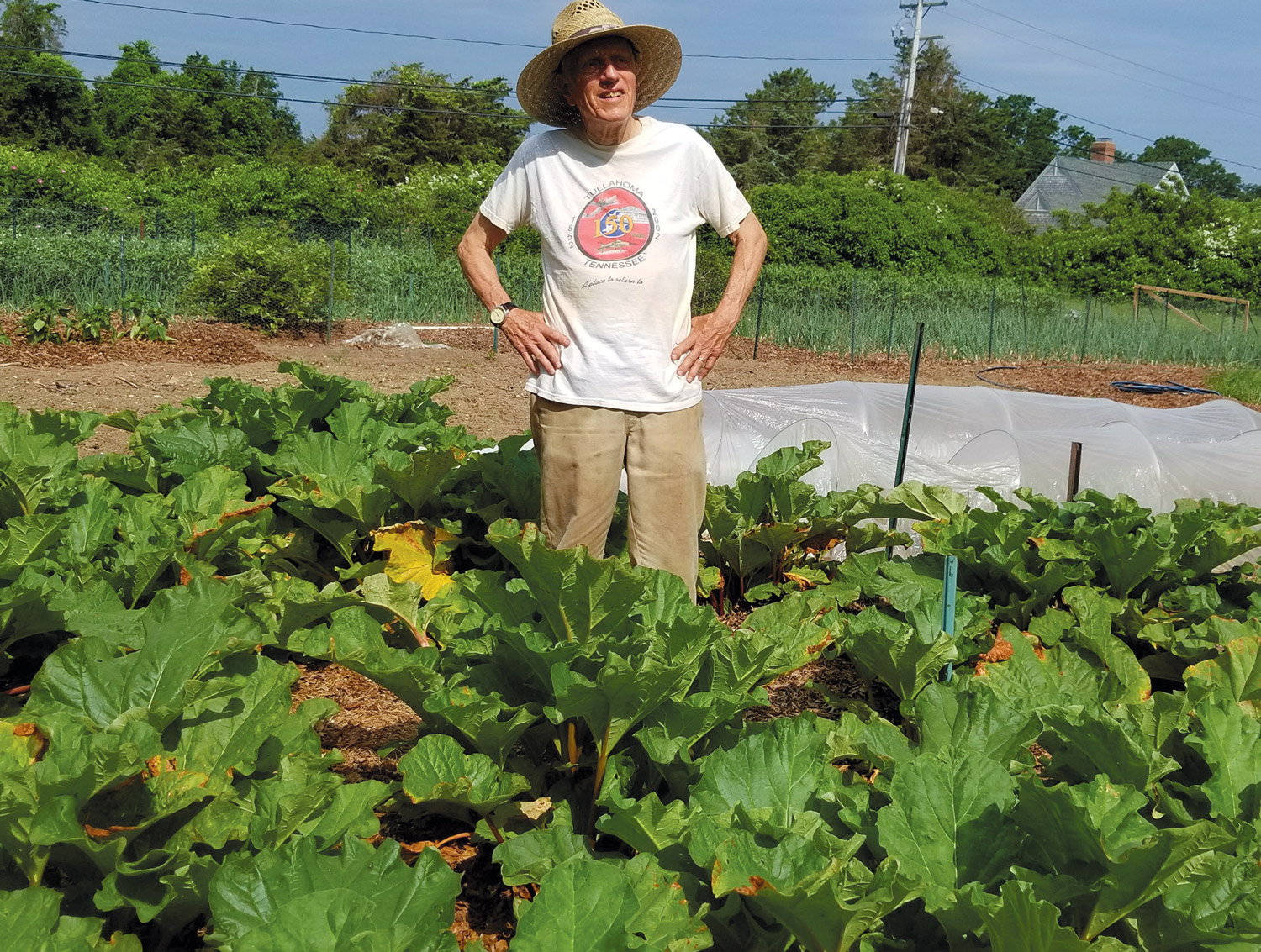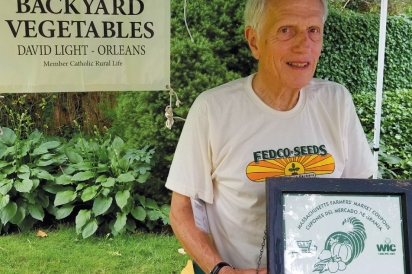Cape Cod Market Gardener
David Light, a U.S. Air Force veteran and former Wisconsin college English professor, moved to Cape Cod in 1983 when he changed careers to become a registered nurse. Now 78, he is enjoying a successful third career as a market gardener selling vegetables, blueberries and raspberries at farmers’ markets in Orleans and Wellfleet. At these weekly events he gets to know all his customers, from his “old codger” friends to families in the bloom of youth.
Having graduated from Colby College, Light later earned a doctorate in English from NYU, and was recruited by the University of Wisconsin at Superior, rising to become Chairman of the English Department. After a successful 15-year tenure at Wisconsin, he decided to change course. He took tests indicating that he had aptitudes for a career either as a police detective or as a nurse.
Developing nursing skills was higher on his course-changing career list than police detecting, so he and his family moved to Orleans. Starting as a nursing orderly in 1986, he graduated from Cape Cod Community College as a Registered Nurse, working for some 15 years in local nursing homes.
As he wound down his nursing career, Light ramped up his gardening output and in 2003 reached out to market manager Gretel Norgeot for a weekly stand at the Orleans Farmers’ Market. Light says he has always had a home garden, which on the Cape amounts to a quarter acre. He adapts the latest farming techniques for intensively growing vegetables, using trickle irrigation and early planting techniques under slitted row covers on degradable mulch for early harvest, weed and pest control.
His heirloom vegetables and small fruit sell out at the markets, where he displays Costata Romanesco zucchini, Walla Wallatype onions, Canadian Red rhubarb and heritage raspberries. Light’s Suyo cucumbers are exceptionally popular, with sales approaching 1000 pounds annually. Business has grown to the point where, “I now have to file an IRS Schedule F farmers tax return,” Light exclaims.
Light is an heirloom vegetable enthusiast. “Heirlooms taste good because they were bred for flavor, not for machine harvesting, long distance hauling and long shelf life,” Light says. “Funny thing, the best tasting fruits and vegetables are often the most nutritious, too.”
His heirloom varieties, such as Corsican sweet onions, Suyo cucumbers and Hungarian heart tomatoes, were handed down generation to generation, some coming via Ellis Island immigrants. Light says, “If it’s an heirloom, it’s open pollinated. Save the seeds and they will breed true. If you buy heirlooms, or grow them yourself, you are helping to save endangered varieties from extinction.” Light is a passionate supporter of biodiversity and asks, “Why did the Irish potato crop fail in 1846?”
Light’s success highlights the value of farmers’ markets for America’s seniors, providing affordable, locally grown fruits and vegetables to improve health, while contributing to the growth and success of small farmers, many of whom are seniors themselves.
Light’s market success also showcases the importance of two popular government nutrition programs that are celebrating their 31st anniversary: the Senior Farmers Market Nutrition Program and the Woman, Infant and Children (WIC) Farmers Market Nutrition Program.
Both were started in 1986 by the Massachusetts Department of Agriculture and were eventually funded by Congress and implemented nationally by the U.S. Department of Agriculture (USDA).
Federal funding for the popular senior program first received Congressional funding in the 2002 Farm Bill. This Senior Farmers Market Nutrition Program now annually helps more than 800,000 seniors who make less than $15,000 per year to access fresh local produce such as that sold from Light’s farm.
Each qualified senior is awarded up to $50 in vouchers annually to invest at farmers’ markets in their state. In fiscal year 2017, the USDA has allocated some $21 million to 51 states and Indian Tribal Organizations to operate the program, a boon to nearly 20,000 farmers who benefited from the extra cash.
Similarly, the WIC program provides vouchers annually to 1.6 million women and their children up to five years of age to purchase produce at farmers’ markets, nearly $20 million worth each year of extra income for farmers.
Light said he appreciates the extra sales from the WIC and senior programs, and he proudly displays his “Massachusetts Farmers Market Coupons Accepted” sign at the market stand, which means that he accepts USDA WIC and Senior vouchers for both nutrition initiatives through the Massachusetts Department of Agricultural Resources.
Besides the extra revenue, Light says he enjoys the social aspects of his market stand too. Local chefs like Mark Ceraldi of restaurant Ceraldi in Wellfleet visit the market regularly and plan their dinner menu around whatever is available that day. On a mid-summer 2016 visit, Ceraldi purchased 15 pounds of Suyo cucumbers from Light’s market stand, for a price well above wholesale. The Nauset Beach Club Restaurant in Orleans also features Light’s vegetables.
During school vacations, Light got an added bonus: his grandson came to work beside him. “It’s a wonderful bonding experience,” he said. Asked what he so enjoys about his third career as an market gardener, he says some days growing and selling his vegetables makes him “feel like a gardening artist, painting a picture, taking it to a local gallery and then, validation, when a customer says, I like your work and want to buy your painting.”






